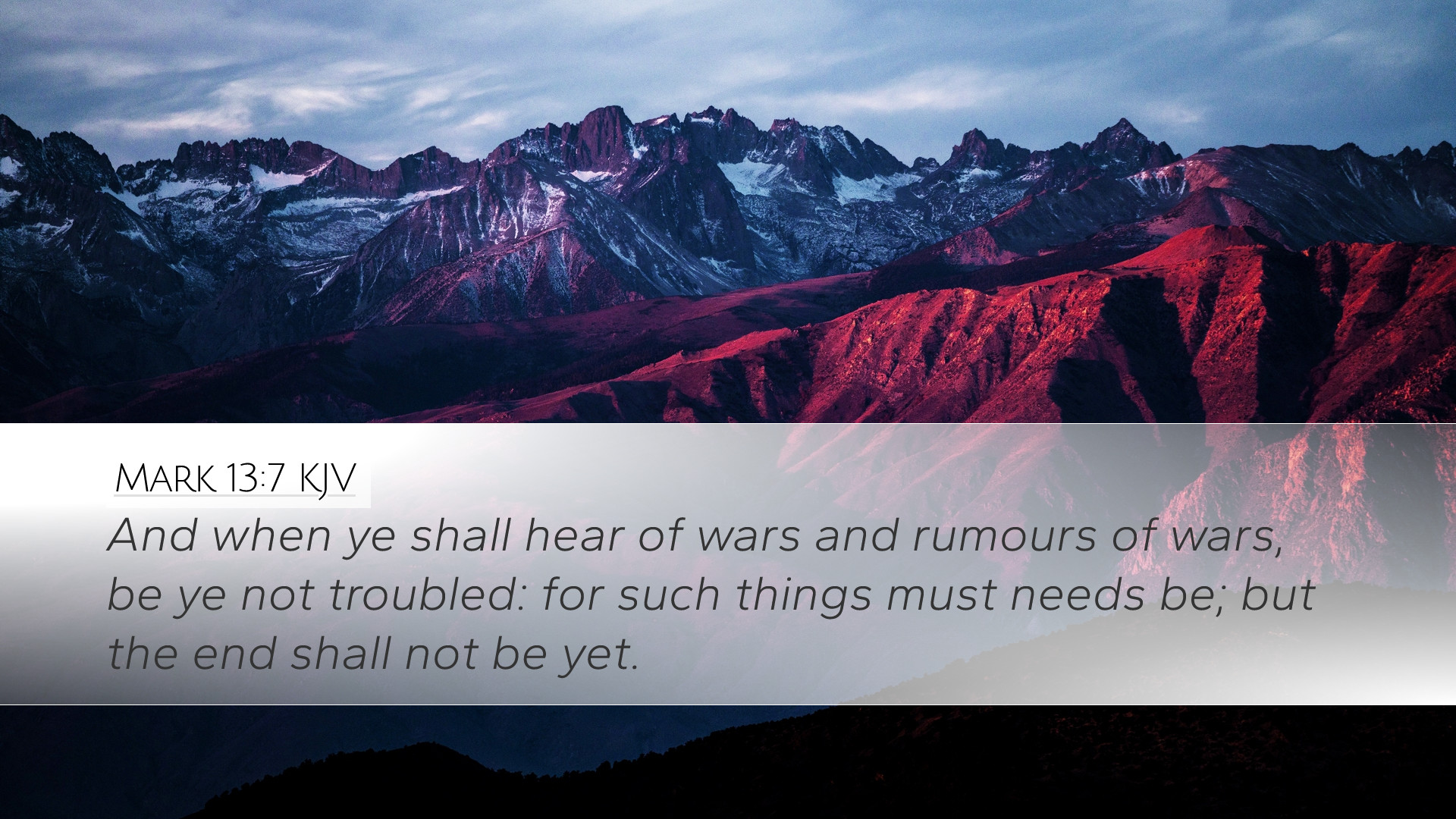Commentary on Mark 13:7
Mark 13:7 states, "And when you hear of wars and rumors of wars, do not be troubled; for such things must happen, but the end is not yet." This verse serves as a precursor to the teachings our Lord imparts about the end times, particularly addressing the disciples’ concerns regarding the future and signs of His coming.
The context in which Jesus speaks this verse is critical. He is responding to His disciples who were marveling at the Temple's grandeur. As they admire the external aspects of the Temple, Jesus foretells its destruction, leading to a discourse on the signs of the times. The verse acknowledges the reality of turmoil in the world while simultaneously steering believers toward a posture of peace and vigilance.
Theological Insights
1. The Reality of Conflict:
The mention of "wars and rumors of wars" highlights the persistent nature of conflict throughout history. Matthew Henry emphasizes that these occurrences are not arbitrary but fall within God's sovereign plan. They serve as a prelude to the eventual fulfillment of divine promises concerning the consummation of all things. Wars, as observed, may arise from earthly ambitions and desires, often reflecting the inherent sinfulness of man.
2. The Call to Endurance:
Albert Barnes points out that the instruction here is not to succumb to fear. The phrase "do not be troubled" suggests a calmness and measured response despite external chaos. This call to perseverance is pivotal for the early Church, who faced persecution. It serves as a reminder that faith in Christ provides the foundation for enduring uncertain times and trepidation surrounding prophetic fulfillment.
3. Prophetic Certainty:
Adam Clarke expands on the interpretation of this statement by asserting that these events should not surprise believers as they reflect the unfolding of God’s prophetic timeline. The announcement that "the end is not yet" underscores a crucial aspect of eschatological teaching. Believers are encouraged to focus on their mission and duties in the present as they await the ultimate fulfillment of God’s redemptive plan.
A Pastoral Perspective
For pastors, this verse can be a source of comfort and guidance. It offers an opportunity to teach congregations about the importance of remaining steadfast in faith amidst the noise of the world. The stability provided by trust in God can be highlighted in sermons, fostering a spirit of resilience in congregants.
Furthermore, pastoral care can incorporate discussions on the nature of worldly conflicts. Encouraging discussions around how believers can respond to societal turmoil with grace and hope is vital. This approach not only addresses immediate concerns but also aligns the congregation's focus toward eternal truths.
Application for Students and Theologians
Students of theology can derive significant insights from Mark 13:7 concerning the intersection of faith and current events. It presents an opportunity to engage critically with the text, examining the implications of Jesus’ words on contemporary issues of war and peace. The historical context, paired with an understanding of biblical prophecy, can inform a robust theological framework that acknowledges the tension between suffering and the hope found in Christ.
Theologians can further explore the hermeneutical implications of this verse within a broader eschatological framework. The continued relevance of such discourses in ecclesiological circles highlights the necessity for rigorous biblical scholarship. It emphasizes an ever-evolving understanding of how Scripture speaks to the human condition, particularly in the light of current global crises.
Conclusion
Mark 13:7 serves as both a warning and a reassurance. It speaks profoundly to the human experience fraught with turmoil while affirming God’s ultimate sovereignty over history. By synthesizing insights from Matthew Henry, Albert Barnes, and Adam Clarke, we see the rich tapestry of theological understanding available to the believer. This verse compels a reflective and active response, urging God’s people to remain steadfast, faithful, and engaged in the mission of the Church in a world rife with uncertainty.


